Physiotherapy in PHYSIOPLEXUS is evidenced by a specialized approach in the different areas it covers. Physiotherapists are directed to areas in which they have professional experience and specialized knowledge. and specialized knowledge.
Our Physiotherapy consultations are based on the profession's standards of practice, scientific evidence and clinical experience of professionals.
We seek with our approach to achieve fast and effective results. and effective.
Our operating model is based on rigorous assessment, physiotherapy diagnosis, clinical reasoning, intervention planning and constant reassessment of results
- Manual Therapyand Osteopathy Techniques
The Advanced Physiotherapy consultation, based on Manual Therapy and Osteopathy, stands out for its rigorous evaluation method, ddiagnosis and the effectiveness of its treatment results.
It differentiates itself by the combination of mobilization, manipulation, massage, stretching and muscle strengthening, which aim to have a positive impact on the muscular, bone, fascial, vascular and nervous tissue.
- Physiotherapy in Temporomandibular Joint Disorders (TMJ)
In the Advanced Physiotherapy consultation for TMJ Disorders we work not only on the temporomandibular joint (TMJ), but at the level of the entire cranio-cervico-mandibular complex, due to its interdependent relationship.
The temporomandibular joint (TMJ) It is one of the most complex joints in the body. Dysfunctions at this level can affect chewing, swallowing, speech and facial expressiveness.
Furthermore, they can cause other dysfunctions and/or postural changes, making it important to think of this joint as an integral part of the cranio-cervico-mandibular complex.
Associated with this dysfunction are a series of signs and symptoms, namely:
- Pain and/or difficulty in opening and/or closing the mouth;
- Joint noises: clicking, crackling, “clicking” or bouncing sensations that appear when opening and/or closing the mouth.
In parallel to these signs and symptoms, it is common for patients to also present:
- Bruxism;
- “Daytime bruxism”, associated with stress and anxiety factors;
- Local pain;
- Pain in the neck and shoulder region;
- Dental reflex pain;
- Headaches;
- Tinnitus and vertigo;
- Fatigue in the face, especially when chewing;
- Sudden change in occlusion.
The treatment of TMJ disorders can be applied in any age, the choice of techniques being adapted to the patient and their clinical condition.
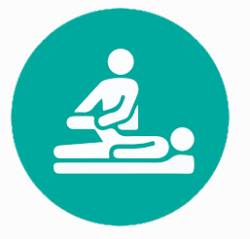

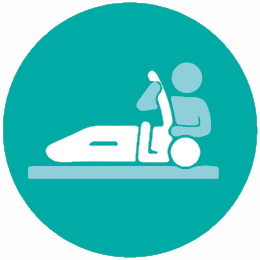
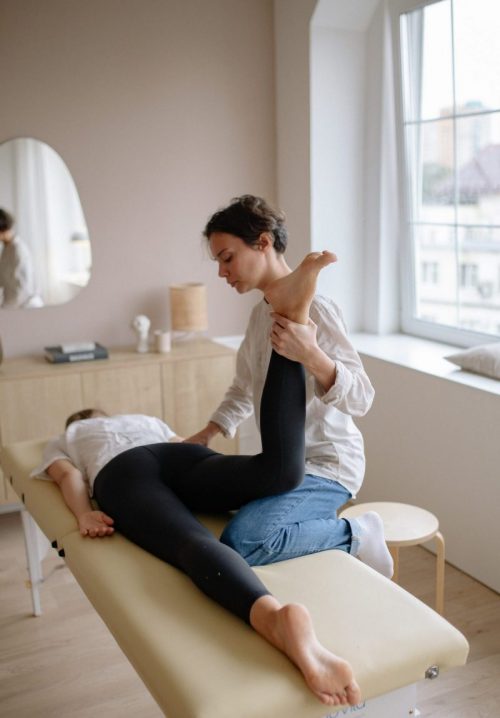
Postural Reeducation
In the Advanced Physiotherapy consultation in Postural Reeducation, a detailed posture assessment which allows us to identify areas where there is greater likelihood of musculoskeletal pathology.
It's important to make early screening, even without associated symptoms, so that we can stop or reverse a process of postural alteration that will lead to future complications. When should you intervene? More and more people are talking about screenings at an early school age, especially during the peak of children's/adolescents' rapid growth, as this is when most postural changes occur. We can talk about a extended monitoring period between the ages of 9 and 14, in order to encompass this peak of rapid growth in different children/adolescents.
As adults, in everyday life, often related to work, we find ourselves adopting less suitable postures and performing repetitive movements that can also contribute to the onset or worsening of postural changes.
At FISIOPLEXUS, the Postural Re-education consultation is based on the fusion of the following areas:
- Physiotherapy
- Osteopathy
- Global Postural Re-education applied to Sport (Philippe Souchard Method);
- Low Pressure Fitness (The International Hypopressive Institute).
Active Global Strectching - Global Postural Reeducation applied to Sport - Method by Philippe Souchard
Active Global Stretching is a derivation of Global Postural Re-education (GPR) which aims to prevent and correct postural changes. This method allows restore strength, length and flexibility to muscle groups stiffened by sports practice or by postures and repetitive movements linked to work activity. In this method, breathing acts as the motor for stretching and the patient always plays an active role in its execution.
Low Pressure Fitnss - The International Hypopressive Institute
It's a method avant-garde training which is based on hypopressive technique, myofascial stretching, postural re-education, neurodynamics with the most advanced didactic methodology of neuroeducation. This method aims to minimise the pressures and body tensionsas well as improving well-being.
Physiotherapy Specialised in Dermatofunctional and Postoperative Plastic Surgery
The Dermatofunctional is the physiotherapy speciality responsible for promoting and rehabilitating the functionality of the integumentary system.
In the Advanced Dermatofunctional Physiotherapy consultation, we work on various conditions of the integumentary system, such as fibro oedema gelóide (cellulite), scars, post-operative plastic surgery, lymphoedema, mastectomies, among others.

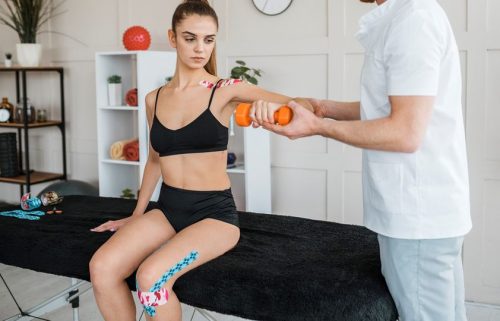
Musculoskeletal Physiotherapy
The Musculoskeletal Physiotherapy has as its main objectives prevent, reduce or eliminate pain or any other symptoms associated with neuro-musculoskeletal problems.
Sports Physiotherapy
The Physiotherapy in Sports Conditions operates in prevention, treatment and reintegration the sports practice of athletes in situations of injury or dysfunction resulting from sports practice or physical activity.
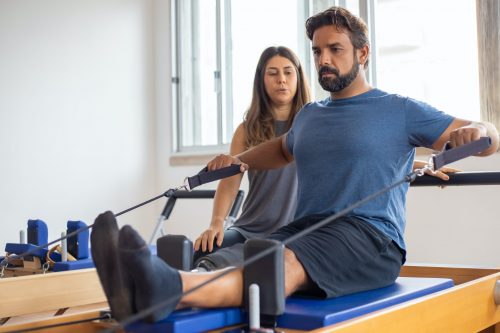
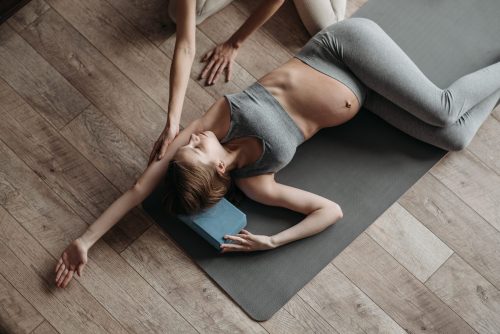
Pregnancy Physiotherapy
The physiotherapy in pregnancy has a important role in each stage of pregnancyalways with a view to promoting women's health and well-being.
The prenatal physiotherapyfor example, prepares the women's bodies for two moments: pre- and post-partum, preventing, treating and rehabilitating possible disfunctions, discomforts, pains or injuries.
Physiotherapy therefore includes stretching and strengthening exercises for certain muscles; aerobic exercises; body awareness; improved blood and lymph circulation, posture correction and relaxation exercises.
Geriatric Physiotherapy
Physiotherapy in geriatric conditions is aimed at health of the elderly and has been since from prevention to rehabilitation. More than rehabilitation, it's important to ppromote functionality and empower the elderly, in order to contribute to healthier ageing, and with better quality of life.
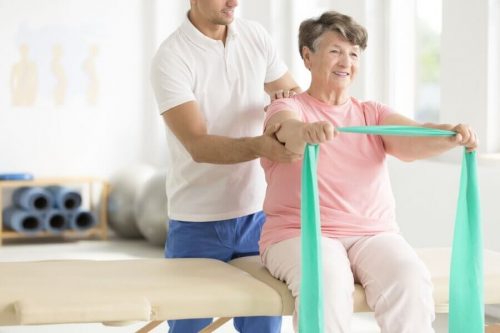
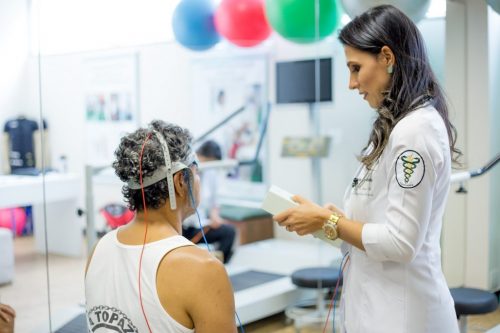
Neurological Physiotherapy
The Neurological Physiotherapy intervenes in neurological pathologiesfor users of all ages.
Empowers the patient to gain in mobility, strength, coordination and functionality to carry out their day-to-day activitiesand creating the conditions for it to adapt to its new context. It thus promotes functionality, independence and autonomyimproving their quality of life.
Oncological Physiotherapy
The Physiotherapy for cancer patients has as its main objective maximising physical, social, emotional and vocational functions evidence-based strategies which, even if limited by the sequelae of the disease and/or treatment approaches, promote independence and the patient's quality of life.
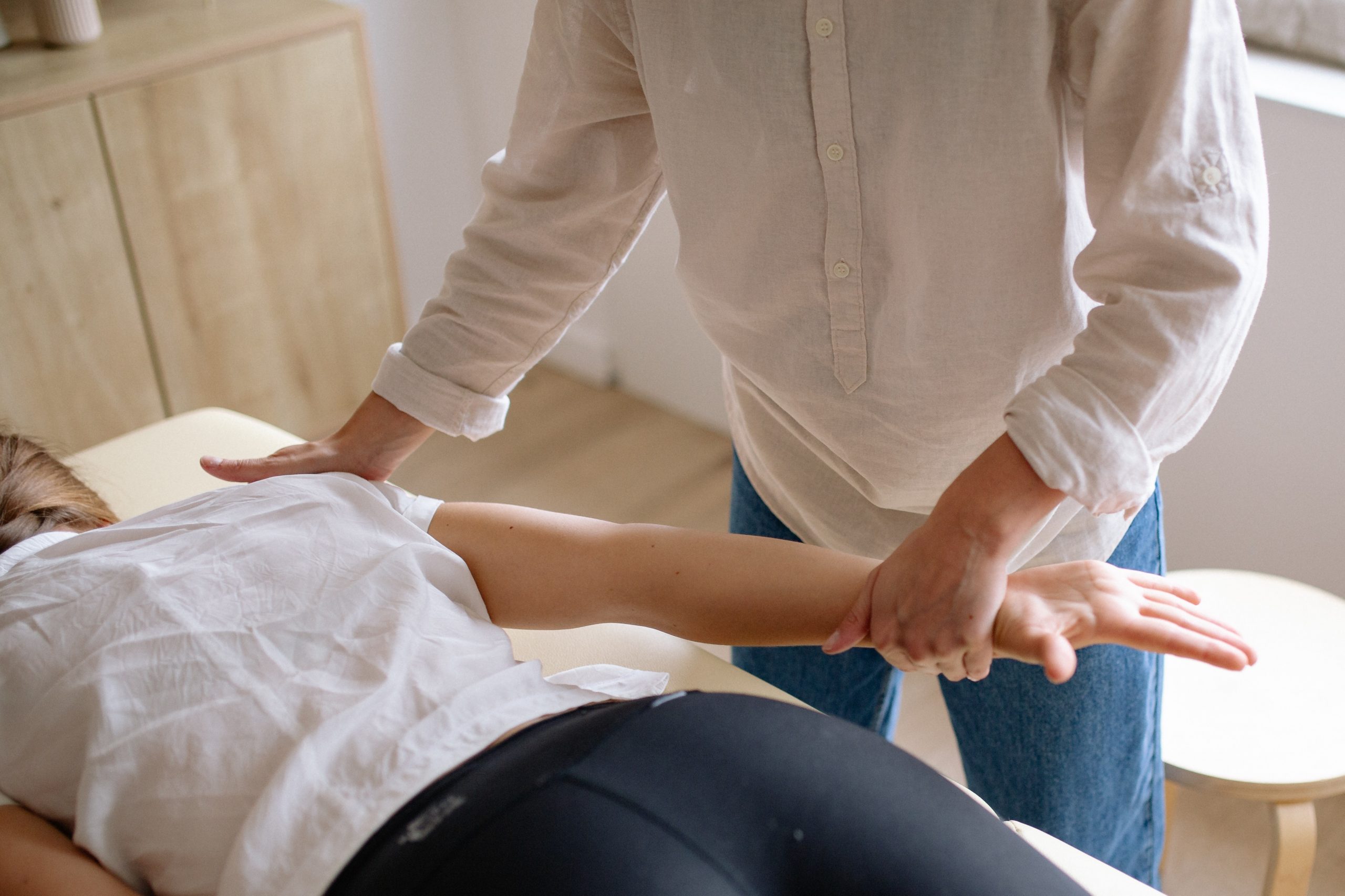
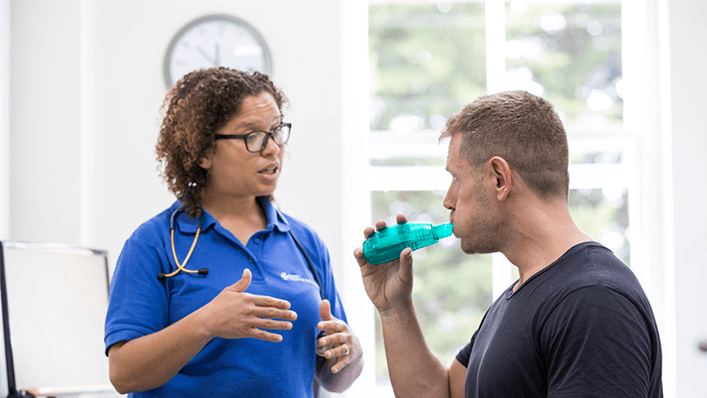
Respiratory Physiotherapy for Adults and the Elderly
The Respiratory Physiotherapy for Adults and the Elderly is a physiotherapy speciality that aims to prevent and treat pathologies affecting the respiratory system.
Respiratory physiotherapy for adults or seniors acts mainly:
- Control of dyspnoea (feeling of breathlessness);
- Improved secretion drainage;
- Improved lung ventilation;
- Prevention and treatment of respiratory infections;
- Increased exercise tolerance;
- Strengthening the respiratory muscles;
- Prevention of general health complications.
Paediatric Respiratory Physiotherapy
The Paediatric respiratory physiotherapy is the speciality of physiotherapy that aims to prevention and treatment of pathologies affecting children's respiratory systems.
Paediatric Respiratory Physiotherapy is recommended in the case of the baby/child present some of the the following symptoms:
- Cough;
- Nasal obstruction;
- Snipe;
- Expectation;
- Accumulation and difficulty in releasing secretions;
- ...
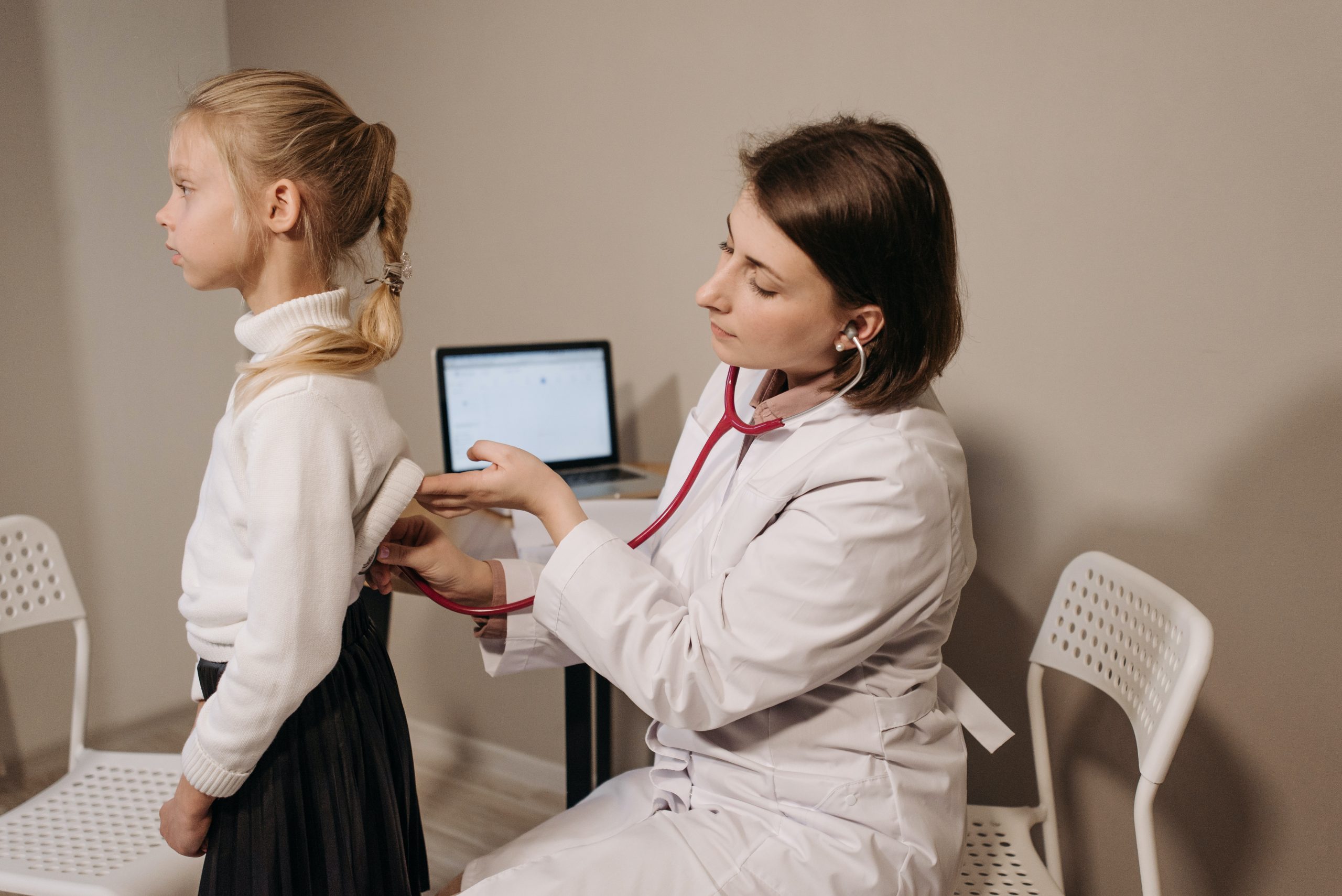
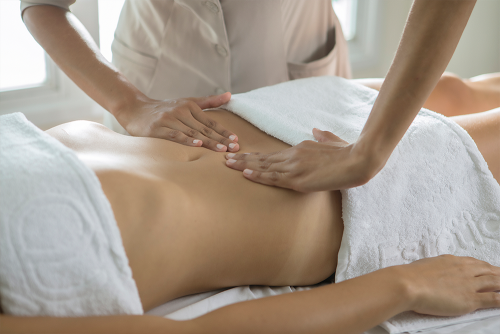
Manual Lymphatic Drainage
The Manual Lymphatic Drainage is a massage technique which promotes lymphatic circulation.
O lymphatic system performs important function in the immune system and is crucial in removing excess fluids from body tissues, toxins, macromolecules and cellular waste.
O malfunction of this system can lead to the appearance of some signs and symptoms, such as: feeling of tired legs, oedema, cellulite, among others.
The manual lymphatic drainage technique is performed using gentle movements and adapted to the patient's clinical condition.
Pressotherapy
The Pressotherapy is a drainage technique "mechanical". Its purpose is to reduce oedema of venous and/or lymphatic origin.
O Pressotherapy device applies intermittent pressures that stimulate venous or lymphatic return. Generally speaking improves blood circulation, favours the reabsorption of oedema and reduces fluid retention.
